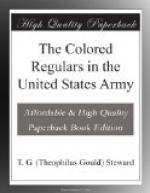That there has been a majestic evolution quietly but rapidly going on in this mass, growing as it was both by natural development and by accretion, is plainly evident. Heterogeneous as were the fragments, by the aid of a common language and a common lot, and cruel yet partially civilizing control, the whole people were forced into a common outward form, and to a remarkable extent, into the same ways of thinking. The affinities within were really aided by the repulsions without, and when finally freed from slavery, for an ignorant and inexperienced people, they presented an astonishing spectacle of unity. Socially, politically and religiously, their power to work together showed itself little less than marvellous. The Afro-American, developing from this slave base, now directs great organizations of a religious character, and in comprehensive sweep invites to his co-operation the inhabitants of the isles of the sea and of far-off Africa. He is joining with the primitive, strong, hopeful and expanding races of Southern Africa, and is evidently preparing for a day that has not yet come.
The progress made thus far by the people is somewhat like that made by the young, man who hires himself to a farmer and takes his pay in farming stock and utensils. He is thus acquiring the means to stock a farm, and the skill and experience necessary to its successful management at the same time. His career will not appear important, however, until the day shall arrive when he will set up for himself. The time spent on the farm of another was passed in comparative obscurity; but without it the more conspicuous period could never have followed. So, now, the American colored people are making history, but it is not of that kind that gains the attention of writers. Having no political organizations, governments or armies they are not performing those deeds of splendor in statesmanship and war over which the pen of the historian usually delights to linger. The people, living, growing, reading, thinking, working, suffering, advancing and dying—these are all common-place occurrences, neither warming the heart of the observer, nor capable of brightening the page of the chronicler. This, however, is, with the insignificant exception of Liberia, all that is yet to be found in the brief history of the Afro-American race.




